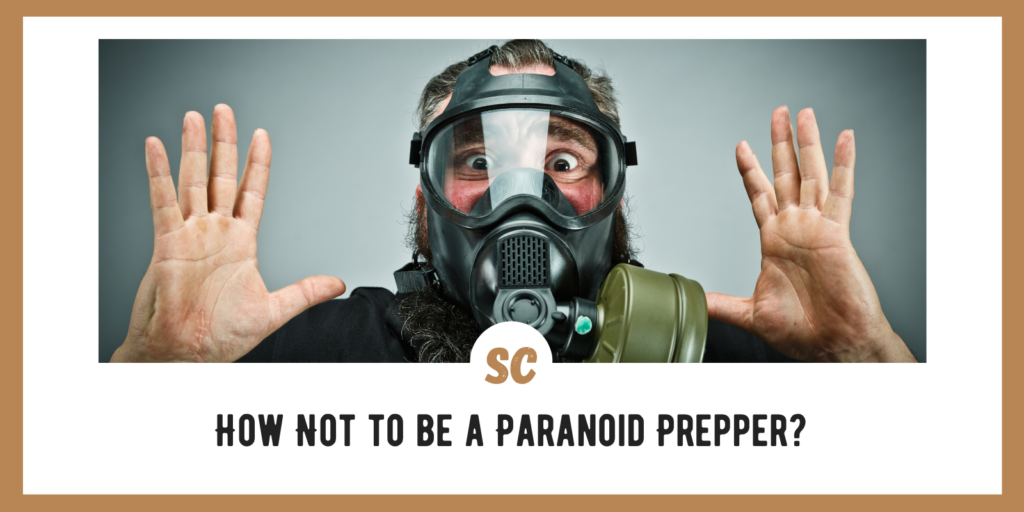Thanks to popular television shows, movies, the media, social media, and other platforms, the terms prepper and paranoid seem to go hand in hand. From my experience, I do not think this is the case with most preppers, although I certainly have seen it.
The simplest definition of paranoia that I found states that it is “unjustified suspicions and mistrust of other people or their actions.” (Bing search result)
I like the above definition because of its simplicity and directness. However, in the past, I have heard plenty of justified reasons and logical lines drawn through many topics that were otherwise deemed “paranoid arguments.” But that is not what this article is about. I am not here to talk about conspiracy theories, to instill mistrust in you, or to encourage you to go down a bunch of rabbit holes.
One of the main reasons I have always encouraged people to prep is in case of a natural disaster and I do not mean a catastrophic event like the Yellowstone Super Volcano erupting. I am talking about tornados, flooding, extreme temperatures, blizzards, and hurricanes because these types of emergencies people deal with quite frequently.
For most other reasons that cause a person to become a prepper it can be easy to be labeled as paranoid because, well, it is easy to become paranoid. Admittedly, the reason it has become easy is that there is so much misinformation that we are constantly subjected to, but that is a topic for another day.
If you want to be a prepper without the paranoia or at least do not want to appear that way, several things can be done to limit that effect.
SKIP AHEAD
Stopping the Paranoia
Limit Technology Time
The easiest and quickest way to become paranoid about almost any topic is to spend too much time watching television, videos, the news, and scrolling through social media.
Given that everybody now carries a smartphone with them 24/7, we have instant access to all the above whenever and wherever we want. Arguably, this kind of access to technology has become an addiction of sorts. Instead of weeding through the bad information to find the right information we take it all in and desire to be notified of updates whether they are right or wrong.
With access to an endless array of worldwide information, misinformation, and people, it is easy to see how a person could become suspicious.
To counter this effect, establish a daily time limit for yourself when using certain technologies, especially as it pertains to viewing this type of material. Moderation is key.
Spend Time with Non-Preppers
This suggestion is somewhat similar to the previous section. Only spending time with other preppers, whether that be in person or communicating online, is going to give a person tunnel vision. If all you are exposed to are people that see the world in a certain way, then you too will only see the world in that manner. For this reason, it is important to try new things and broaden your horizons by spending time with non-preppers.
Take Breaks from Prepping
Many people that are involved in prepping are passionate about it. This is completely understandable considering that the foundation of prepping has to do with an individual’s safety as well as protecting family or friends. That is not a responsibility to take lightly.
However, prepping is like anything else, if all you do is concentrate on it then you will become hyper-focused on the subject and will likely not deal with any other topic. Also, this can become exhausting and lead to burnout.
It is important to take breaks from prepping from time to time and to do other things that you enjoy. Think of it as taking mini-vacations that allow you to “reset” and thereby not become inadvertently obsessed and paranoid.
Don’t Think of it as Prepping
I may be splitting hairs here but there are quite a few aspects to prepping that do not have to directly be related to it and therefore do not have to be discussed in that way.
Usually, when people ask preppers why they do a certain thing, the answer that is given can sound paranoid. Here are a few examples.
Question: “Why do you have a food garden?”
Answer: “Because it is important to have a renewable, backup source of food in case something happens to the supply line or the grocery stores close down.”
Instead, think of gardening as a way of enjoying the outdoors while being self-reliant and producing your own healthy food.
Question: “Why do you have so much food in your pantry?”
Answer: “In case something happens to the supply chain, and we are cut off, left to fend for ourselves.”
Instead, say that you like to buy in bulk because it saves money and means fewer trips to the store, or that you like have a little extra food on hand in case of a bad storm.
Question: “Why are you so interested in survival skills?”
Answer: “In case civilization collapses, it will prepare me for bad times.”
Instead, think of primitive skills and survival skills as something that everyone should know about. Primitive skills are a part of our history, and many survival skills should be common knowledge, such as purifying unclean water, navigating, and basic first aid techniques. These types of skills are also helpful to know because they can be fun to practice or are relevant to you. This can be especially true for people who spend a lot of time in the outdoors.
See, there are many things like the above that people do or become involved in for the sake of prepping but by changing your perspective you may see that those things can be accomplished for other reasons.
Limit What You Say
The last suggestion is not so much about not being paranoid as it is limiting the perception of it. Take a moment and think about the people around you and what they frequently talk about.
I am going to go out on a limb and say that most people talk about “normal” everyday things like work, bills, their kids, family, and what is going on with so and so down the street. If you are a part of a conversation like this and start interjecting opinions or viewpoints that may seem off-topic, you will most likely get a few interesting looks and eye rolls.
Even when a topic may relate to prepping such as the economy or politics, many people only have superficial information and they do not care to dive any deeper.
You may be deeply knowledgeable about a topic, possibly more so than those around you, but by offering up that kind of information you may come off as being paranoid.
The best way to counter their perception of you is to do your best at reading the room. That is to say know your crowd and whether or not they would be perceptive to a prepper’s perspective. If they seem interested or are asking specific questions, then by all means offer what you know. If they are not, then only offer superficial information in exchange.
Wrap Up
In modern times, the life of a prepper can be an interesting one. To some degree, a preppers lifestyle used to be considered normal and sometimes was even encouraged. Oddly enough, we are told to be self-reliant but only to a certain degree.
For whatever reasons or conclusions that jumpstarted your journey into prepping, a state of continued paranoia can be detrimental to your overall goals and should be controlled to the best of your abilities.
Thanks for reading and stay prepared!
If you have any thoughts or questions about the above article be sure to sound off in the comment section below and let us know!



